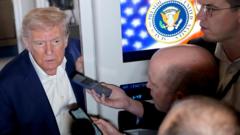The article text follows:
In a notable development, US President Donald Trump's administration has announced the exemption of smartphones, computers, and several other electronic devices from "reciprocal" tariffs, which included steep 125% duties on imports from China. A notification from US Customs and Border Protection confirmed that these goods will be excluded from Trump's 10% global tariff affecting most nations and the significantly higher Chinese import duties. This exemption marks a crucial reprieve amid Trump's intensified tariff imposition on China, prompting one trade analyst to consider it a "game-changer scenario."
While traveling to Miami late on Saturday, Trump indicated he would provide additional details about the exemptions at the start of the following week, stating, "We'll be very specific. But we're taking in a lot of money. As a country we're taking in a lot of money." The decision came after growing fears from US tech companies that their product prices could surge due to manufacturing reliance on China. Included in the backdated exemptions are other electronic devices and components such as semiconductors, solar cells, and memory cards.
"This is the dream scenario for tech investors,” remarked Dan Ives, global head of technology research at Wedbush Securities, on social media platform X. “Excluding smartphones and chips is transformative regarding China tariffs.” Major tech players, including Apple, Nvidia, and Microsoft, expressed relief over this development. The White House clarified that the exemptions are intended to provide businesses with more time to transition production back to the US.
Press Secretary Karoline Leavitt articulated, “President Trump has made it clear America cannot rely on China for critical technology production like semiconductors and smartphones," emphasizing the urgency for these companies to accelerate their manufacturing in the US. Over the weekend, Trump expressed contentment with the high tariffs, hinting at a positive outcome from the strain on trade relations with China, despite an ongoing high 20% tariff concerning fentanyl.
Experts warned that iPhone prices in the US could have dramatically soared—potentially tripling—had the costs been fully transferred to consumers. Apple is particularly affected, as it accounted for over half of smartphone sales last year and has been striving to diminish its dependency on Chinese manufacturing. Recent reports suggest that Apple is hastening production in India to bolster its supply chain diversification efforts.
Initially, Trump had outlined plans for imposing considerable tariffs on numerous countries, but he recently announced a 90-day pause on these measures, leaving only China subject to heightened tariffs now reaching 145%. This pause is characterized as a strategic negotiating tool aimed at securing better trade agreements globally. Trump's stance is that these tariffs will rectify perceived inequities in the international trading system while facilitating the return of US jobs and industries.
In a notable development, US President Donald Trump's administration has announced the exemption of smartphones, computers, and several other electronic devices from "reciprocal" tariffs, which included steep 125% duties on imports from China. A notification from US Customs and Border Protection confirmed that these goods will be excluded from Trump's 10% global tariff affecting most nations and the significantly higher Chinese import duties. This exemption marks a crucial reprieve amid Trump's intensified tariff imposition on China, prompting one trade analyst to consider it a "game-changer scenario."
While traveling to Miami late on Saturday, Trump indicated he would provide additional details about the exemptions at the start of the following week, stating, "We'll be very specific. But we're taking in a lot of money. As a country we're taking in a lot of money." The decision came after growing fears from US tech companies that their product prices could surge due to manufacturing reliance on China. Included in the backdated exemptions are other electronic devices and components such as semiconductors, solar cells, and memory cards.
"This is the dream scenario for tech investors,” remarked Dan Ives, global head of technology research at Wedbush Securities, on social media platform X. “Excluding smartphones and chips is transformative regarding China tariffs.” Major tech players, including Apple, Nvidia, and Microsoft, expressed relief over this development. The White House clarified that the exemptions are intended to provide businesses with more time to transition production back to the US.
Press Secretary Karoline Leavitt articulated, “President Trump has made it clear America cannot rely on China for critical technology production like semiconductors and smartphones," emphasizing the urgency for these companies to accelerate their manufacturing in the US. Over the weekend, Trump expressed contentment with the high tariffs, hinting at a positive outcome from the strain on trade relations with China, despite an ongoing high 20% tariff concerning fentanyl.
Experts warned that iPhone prices in the US could have dramatically soared—potentially tripling—had the costs been fully transferred to consumers. Apple is particularly affected, as it accounted for over half of smartphone sales last year and has been striving to diminish its dependency on Chinese manufacturing. Recent reports suggest that Apple is hastening production in India to bolster its supply chain diversification efforts.
Initially, Trump had outlined plans for imposing considerable tariffs on numerous countries, but he recently announced a 90-day pause on these measures, leaving only China subject to heightened tariffs now reaching 145%. This pause is characterized as a strategic negotiating tool aimed at securing better trade agreements globally. Trump's stance is that these tariffs will rectify perceived inequities in the international trading system while facilitating the return of US jobs and industries.





















